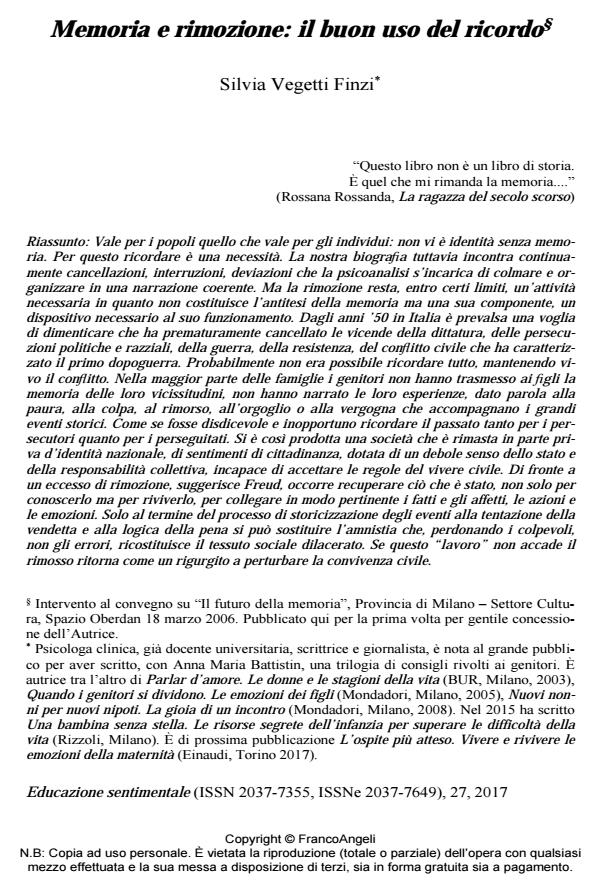Memoria e rimozione: il buon uso del ricordo
Journal title EDUCAZIONE SENTIMENTALE
Author/s Silvia Vegetti Finzi
Publishing Year 2017 Issue 2017/27
Language Italian Pages 0 P. 118-125 File size 157 KB
DOI 10.3280/EDS2017-027009
DOI is like a bar code for intellectual property: to have more infomation
click here
Below, you can see the article first page
If you want to buy this article in PDF format, you can do it, following the instructions to buy download credits

FrancoAngeli is member of Publishers International Linking Association, Inc (PILA), a not-for-profit association which run the CrossRef service enabling links to and from online scholarly content.
Remembrance and removal: the good use of the memory. No identity without memory: the same goes for nations as well for individuals. So remembering is a necessity. However our biography always comes across deletions, disruptions, deviations that psychoanalysis takes charge of filling and organising in a coherent narrative. Anyway removal is, within limits, a required work because it is not the opposite of memory, but a part thereof, a system required for the operation. Since the 1950s in Italy prevailed a will to forget that prematurely erased events of dictatorship, political and racial persecution, war, resistance, civil conflict that marked the Post-World War I. Remembering everything in order to keep alive conflict probably was impossible. In most families parents did not pass on to their children the memory of their ups and downs, they did not tell their experiences or voice fear, fault, regret, pride or shame associated to great historical events. As is remembering the past was disgraceful and inappropriate both for persecutors and persecuted. The effect is a society with an incomplete national identity, weak citizenship, sense of statehood and social responsibility, unable to embrace civil code. In the face of an excess of removal, as Freud says, has to be retrieved everything that went before, not only for knowing it but for reliving, for connecting in a proper way facts and feelings, actions and emotions. Only after the historicization of events revenge and punishment can be replaced by amnesty that, forgiving perpetrators, and not mistakes, reconstructs the dilacerated social fabric. Without this "work" what was removed comes back like a regurgitation to disturb the civil coexistence.
Keywords: Memory, identity, history, oblivion, removing, remembering to forget.
Silvia Vegetti Finzi, Memoria e rimozione: il buon uso del ricordo in "EDUCAZIONE SENTIMENTALE" 27/2017, pp 118-125, DOI: 10.3280/EDS2017-027009